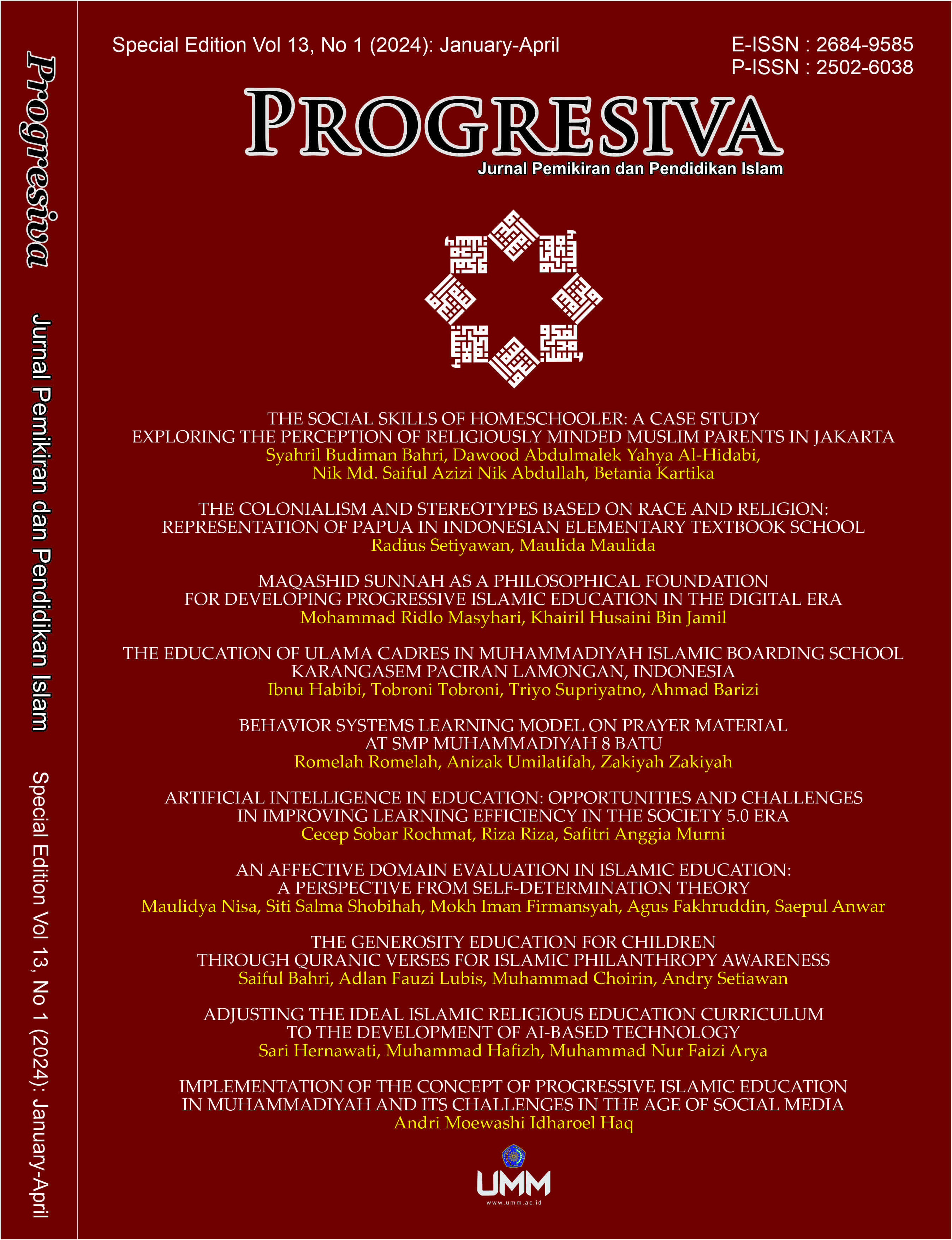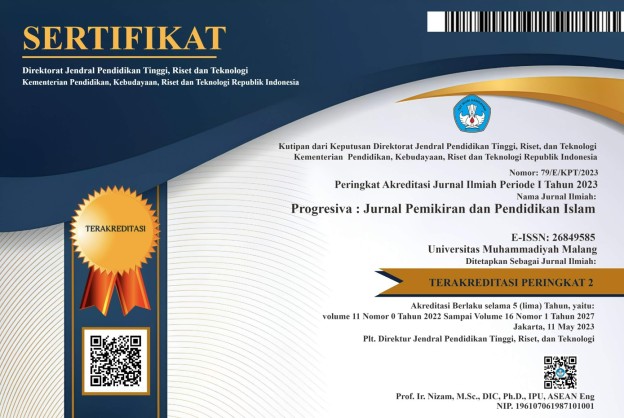The Social Skills of Homeschooler: A Case Study Exploring the Perception of Religiously Minded Muslim Parents in Jakarta
DOI:
https://doi.org/10.22219/progresiva.v13i01.30954Keywords:
homeschooling, Homeschooled Children, Social Skills, Socialization, The Goal of Social SkillAbstract
The issue of social skills is always at the centre of the homeschooling discussion. Many studies have been carried out on homeschooled children’s social skills, but very little research has attempted to explore homeschooled children’s social skills from the perspective of both the homeschooling father and the homeschooling mother, especially those who are religiously minded Muslims. This paper highlighted the perspectives of religiously minded Muslim homeschooling parents on their children’s social skills. The researchers used a case study approach in a qualitative research design. A homeschooling father and a homeschooling mother were both purposefully chosen as informants. Individual interviews were conducted with both informants. To analyse the data, the researchers employed thematic analysis. Several themes emerged from the research. The findings revealed that the social skills of homeschooled children are the capacity to adapt to society, the ability to establish relationships, and the competence to manage disagreements. Moreover, the goal of social skills is to build harmony by achieving Allah's pleasure, followed by gaining people's pleasure.
Downloads
References
Ahmad, I. S. (2017). Doing Qualitative Research for Beginners: From Theory to Practice. In Partridge. Patridge Publishing.
Aisyah, N. N., & Maharani, A. S. (2023). Implementasi Nilai Pendidikan Karakter Melalui Homeschooling. Prosiding Seminar Nasional Pendidikan Non Formal, 1.
Ananda, L. R., & Kristiana, I. F. (2017). Studi Kasus: Kematangan Sosial Pada Siswa Homeschooling. Jurnal EMPATI, 6(1). https://doi.org/10.14710/empati.2017.15090
Ariefianto, L. (2017). Homeschooling : Persepsi, Latar Belakang dan Problematikanya (Studi Kasus pada Peserta Didik di Homeschooling Kabupaten Jember). Jurnal Edukasi, 4(2), 21. https://doi.org/10.19184/jukasi.v4i2.5205
Aziz, A. N., Rahmatullah, A. S., Anjasari, T., & Janti, S. A. (2023). Efek Psikologis Pembelajaran Homeschooling dalam PenerapanTeori Sosial Kognitif dan Konstruktivisme. AKSARA: Jurnal Ilmu Pendidikan Nonformal, 09(1).
Bazeley, P. (2009). Analysing Qualitative Data: More than Indentifying Themes. Malaysian Journal of Qualitative Research, 2(9).
Blundon, J. (2008). Children’s Social Skills Training: Relative Effectiveness of Three Training Models. [Unpublished doctoral thesis]. Dickinson University.
Bremmer, C. D., & Smith, J. (2004). Teaching social skills. National Center on Secondary Education and Transition.
Busse, R. T. (2005). Encyclopedia of School Psychology. Thousand Oaks, CA: SAGE.
Creswell, J. W. (2013). Qualitative Inquiry & Research Design: Choosing Among Five Approaches (3rd ed.). SAGE Publications.
Dewi, A. S. (2020). Homeschooling Di Keluarga Penghafal Al-Quran. Dialektika, 7(1), 89–104. https://doi.org/10.32816/dialektika.v7i1.1348
Dreyer, M. C. (2017). FORMER HOMESCHOOLED STUDENTS ’ PERCEPTIONS OF SOCIAL SKILLS ATTAINMENT. California State University [unpublished thesis].
Glaughlin, S. M. (2018). The Process Socialization from Parents Who Home-educate their children. [Unpublished doctoral thesis]. University of Phoenix.
Gresham, F. M., Sugai, G., & Horner, R. H. (2001). Interpreting outcomes of social skills training for students with high-incidence disabilities. Exceptional Children, 67(3). https://doi.org/10.1177/001440290106700303
Hardiansyah, F. (2020). PROGRAM BIMBINGAN PRIBADI SOSIAL UNTUK MENGEMBANGKAN KETERAMPILAN SOSIAL PESERTA DIDIK HOMESCHOOLING. Jurnal Bimbingan Penyuluhan Islam, 2(1). https://doi.org/10.32332/jbpi.v2i1.2048
Hurriah, L., Mulyaningsih, D., & Averoes, P. M. (2023). Persepsi Masyarakat terhadap Kemampuan Sosial pada Siswa Homeschooling. Prosiding Seminar Nasional Pendidikan Non Formal, Vol. 1.
Inayah, I., Fitria, H. H. N., & Mustaqim, M. (2023). Eksplorasi Perkembangan Sosio Emosional Siswa Homeschooling Usia Anak-Anak. Prosiding Seminar Nasional Pendidikan Non Formal, Vol. 1.
Jurevičienė, M., Kaffemanienė, I., & Ruškus, J. (2018). Concept and Structural Components of Social Skills. Baltic Journal of Sport and Health Sciences, 3(86). https://doi.org/10.33607/bjshs.v3i86.266
Kho, L. (2007). Homeschooling untuk anak. Kanisius.
Kinda, A. C., & Ramadhani, M. M. (2023). Peran Orang Tua Terhadap Perkembangan Mental Anak Melalui Pembelajaran Homeschooling. Prosiding Seminar Nasional Pendidikan Non Formal, 1.
Medlin, R. G. (2000). Homeschooling and the question of socialization. Peabody Journal of Education, 107.
Medlin, R. G. (2006). Homeschooled Children’s Social Skills. Online Submission, 17(1).
Medlin, R. G. (2013). Homeschooling and the Question of Socialization Revisited. Peabody Journal of Education, 88(3). https://doi.org/10.1080/0161956X.2013.796825
Myers, S. dale. (2020). Socialization of Homeschooled Students. [Unpublished doctoral thesis]. Regent University.
Naimah, T. (2019). Konsep dan Aplikasi Homeschooling dalam Pendidikan Keluarga Islam. Islamadina : Jurnal Pemikiran Islam. https://doi.org/10.30595/islamadina.v0i0.4495
Nasir, I. (2004). Socialization. Dar Aman.
Nabila, P. A. D., Humaidi, M. N., & Mukhlis, F. (2023). Pembinaan Karakter Cinta Tanah Air Melalui Habituasi: Sekolah Dasar Islam Terpadu (SDIT) Robbani Malang. Tarlim: Jurnal Pendidikan Agama Islam, 6(2), 149–166.
Patton, M. Q. (2002). Qualitative research and evaluation methods. Thousand Oaks. Cal.: Sage Publications.
Pusat Data dan Analisa Tempo. (2019). Homeschooling: Alternatif Belajar di Luar Sekolah Formal. TEMPO Publishing.
Ramdhani, N. R., & Syafnahayati, I. (2023). Sekolah Alternatif Homeschooling dalam Menumbuhkan Kesehatan Mental Peserta Didik. Prosiding Seminar Nasional Pendidikan Non Formal, 1.
Sheridan, S. M., & Walker, D. (1999). The Handbook of School Psychology (3rd ed.). Wiley.
Suminar, T., Budiartati, E., Arbarini, M., Utsman, & Imtinan, F. S. (2020). Pelatihan Bagi Tutor Homeschooling: Model Pendidikan Karakter Berbasis Etnopedagogik untuk Pengembangan Kecakapan Personal dan Sosial di Homeschooling Primagama Kota Semarang. Jurnal Panjar, 2(1).
Ummami, F., Hamaidi, M. N., & Mukhlis, F. (2023). Implementation Oof Multicultural Education in Strengthening Inter Religious Tolerance at Taman Harapan High School Malang City. MUDIR (Jurnal Manajemen Pendidikan) P-ISSN, 5(2), 2657–2230.
Yount, A. M. (2017). A Case study exploring homeschoolers’ social skills in the workplace as perceived by homeschooled professional adults in Indiana. [Unpublished doctoral thesis]. Northcentral University.
Yulianingsih, E. (2023). Homeschooling: Penguatan Akademik Dan Keterampilan Sosial Siswa. At Tarbiyah: Jurnal Pendidikan, Kebudayaan Dan Keislaman, 1, 40–51.
Zul Afiat. (2019). HOMESCHOOLING; PENDIDIKAN ALTERNATIF DI INDONESIA. Visipena Journal, 10(1). https://doi.org/10.46244/visipena.v10i1.490
Downloads
Published
How to Cite
Issue
Section
License
Copyright (c) 2023 Syahril Budiman Bahri, Dawood Abdulmalek Yahya Al-Hidabi, Nik Md. Saiful Azizi Nik Abdullah, Betania Kartika

This work is licensed under a Creative Commons Attribution-ShareAlike 4.0 International License.


















